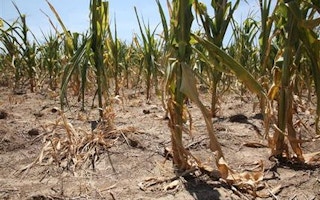Global pressure on the United States to relax its ethanol quota mounted on Thursday as the top United Nations food official said an “immediate, temporary suspension” of the mandate could help head off another world food crisis.
As the surge in corn prices revives a fierce food versus fuel debate, José Graziano da Silva, the director-general of the UN’s Food and Agriculture Organization, wrote in the Financial Times newspaper that competition for a US corn crop that has been decimated by drought was only going to intensify.
“Much of the reduced crop will be claimed by biofuel production in line with US federal mandates, leaving even less for food and feed markets,” he wrote in an op-ed just a day before the US government issues a pivotal crop report that is expected to show US corn output falling to the smallest in six years and stockpiles at near record lows.
“An immediate, temporary suspension of that mandate would give some respite to the market and allow more of the crop to be channeled towards food and feed uses,” he wrote in a high-profile, yet indirect, message to Washington.
Under the five-year-old Renewable Fuels Standard (RFS), US fuel companies are required to ensure that 9 percent of their gasoline pools are made up of ethanol this year, which means converting some 40 percent of the corn crop into the biofuel.
Silva joins a growing and diverse chorus of people calling for an unprecedented waiver or suspension of the RFS. This week, 25 US Senators urged the Environmental Protection Agency (EPA) to adjust the mandate, while the chief executive of grains giant Cargill said the free market should dictate biofuels use.
Livestock producers, which are forced to bid against ethanol producers to secure costlier grain for feed, were first to ask for relief. However, the EPA has yet to receive an official petition for a waiver, which can only come from a fuel blender or a state governor, according to the legislation.
Silva said that the world food system had not yet reached a crisis point, but reiterated warnings against the kind of export restraints and panic buying that extended the surge in 2008.
“Countries and the UN are better equipped than in 2007-08 to face high food prices,” he said. “However, risks are high and the wrong responses to the current situation could create it.”
Why, why not
While the RFS program faces growing critics, it also has strong support from Farm Belt politicians in an election year and has been a core part of President Obama’s “all of the above” energy plan. Some say suspending it would do little to relax demand.
For one thing, the RFS already offers a degree of flexibility to blenders, who can purchase or borrow bankable credits known as Renewable Identification Numbers, or RINs, if they aren’t able to buy enough physical ethanol to meet their requirements.
For another, experts say refiners would likely continue buying almost as much ethanol even without the RFS since they use it as an additive to make the cleaner-burning fuel required in most of the country.
And waiving the mandate could have several unintended effects, such as dampening investment in cellulosic and other advanced biofuels that could cut dependence on food crops for making fuel, or damage the market for dried distillers’ grains, an ethanol byproduct sold as a livestock feed.
In 2008, Texas Governor Rick Perry petitioned the EPA to cut the mandate in half for that year. The EPA refused, but in doing so it made clear that future petitions would have to prove that the RFS itself was causing severe economic harm and not just contributing to any such condition.

















